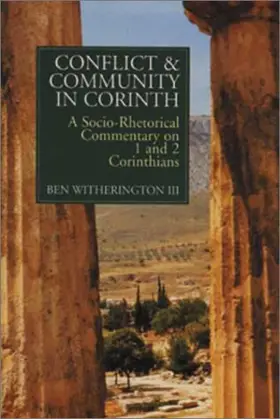

Conflict and Community in Corinth: A Socio-Rhetorical Commentary on 1 and 2 Corinthians
in Socio-Rhetorical Commentary
Pages
487
Publisher
Eerdmans
Published
1/1/1995
ISBN-13
9780802801449
Collections
This book appears in the following featured collections.
- The Pastor’s Bookshelf by Scot McKnight
- Recommended New Testament Commentaries for Evangelical Pastors by Thomas R. Schreiner
Reviews
Witherington has developed his own commentary series (it is not an official series, but it is complete, as he has covered the whole New Testament through different publishers). He dubs his approach “socio-rhetorical,” combining careful consideration of the socio-historical context behind the NT text with attentiveness to the rhetorical format and forms within the text. Many, including myself, consider his best volumes in this “series” to be 1–2 Corinthians (Conflict and Community in Corinth) and Acts (The Acts of the Apostles).
[Full Review]
Like Witherington’s other commentaries in this Socio-Rhetorical series, there is a wealth of background material here which will enhance one’s reading of 1 and 2 Corinthians. In this series I particularly appreciate the excursuses, labeled “A Closer Look At.” His five pages on glossolia in Corinth are excellent, likewise his section on Rules for Meals. The introduction to the books isone of the best I have read. Since these books are letters, Witherington attempts to develop Paul’s rhetoric, employing technical language of the Greco-Roman orator. This is not overly burdensome but may confuse readers not familiar with terms like Probatio.
[Full Review]
This review is for the 1 Corinthians portion of the commentary.
Ben highlights a lot of helpful info to interpret the situation behind 1 Corinthians. Fittingly, his socio-rhetorical info focuses mainly on Greco-Roman cultural specifics. Of course, due to the nature of the commentary, this will be lighter on theological issues, but I would recommend it when used as a supplemental commentary.




